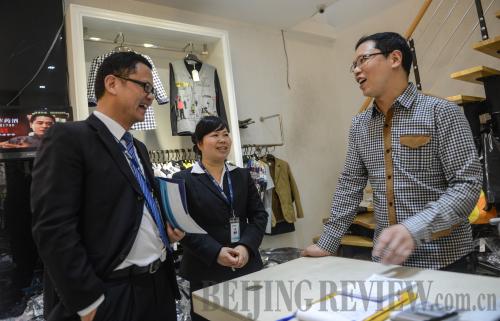

 |
|
CUSTOMIZED SERVICE: Zhang Hong (center), customer relations manager at Zhejiang-based Taizhou Bank, visits a clothing shop owner to discuss his financing needs on March 18. The bank has rolled out new services to meet the financial needs of small and micro-sized enterprises (HAN CHUANHAO) |
As China looks to transform its growth model, the country recently laid out guidelines to ensure that the financial sector supports its economic rebalancing efforts.
The State Council issued a 10-measure guideline for the financial sector on July 5. The governing body reiterated that it will maintain a prudent monetary policy and a reasonable money and credit supply to support economic restructuring after a cash crunch sent interbank borrowing rates to record highs in June.
It also pledged to press ahead with financial reforms and strike a balance between stabilizing economic growth, adjusting its economic structure and guarding against financial risks.
"China's economic operation is generally stable but there are outstanding structural problems. A misallocation of capital is challenging the country's financial system," the guideline stated.
The guideline covers many areas of the financial sector and calls for channeling credit to the real economy—the part of the economy that is concerned with actually producing goods and services, as opposed to the buying and selling in capital markets and inviting private capital to the financial sector.
The China Banking Regulatory Commission (CBRC) was mainly responsible for drawing up the guideline, having consulted with the People's Bank of China (PBOC), the country's central bank, China Insurance Regulatory Commission, China Securities Regulatory Commission and 13 government departments. It also solicited opinions from local governments and experts.
Li Huiyong, an economist at the Shanghai-based Shenyin Wanguo Securities, said that the guideline illustrates China's resolve to focus on stabilizing economic growth and shift away from the days of easy credit.
Funding the real economy
As money flocks to the more profitable property sector and financial markets, not enough is left for the real economy. Total social financing surged 50.2 percent to 9.11 trillion yuan ($1.48 trillion) during the first five months of the year, according to the PBOC.
Wei Jianing, Deputy Director of the Macroeconomic Research Department at the Development Research Center of the State Council, said the problem is not a lack of capital by itself, but a dearth of capital available for the real economy.
"Private companies and innovation-driven enterprises, which stand for the future of the economy, can't get enough financial services and loans," he said.
To this end, the regulation says that the central bank will help financial institutions ensure that credit is available for small enterprises, the agricultural, advanced manufacturing and information technology sectors, as well as labor-intensive industries. However, credit will be curbed in sectors with overcapacity and credit risks for the property sector will be more strictly monitored.
It also says that banks' wealth management products should be connected to real economy projects. With the right guidance, several trillion yuan of wealth management products will fund the real economy, according to analysts.
Wealth management products are short-term investment vehicles sold by banks to the public, offering rates above the State-mandated 3-percent savings rate. The interbank borrowing rate spike in June partly stemmed from funding wealth product payouts promised at the end of each month, said analysts.
"Chinese Premier Li Keqiang has repeatedly called for the banking sector to revitalize its stock of capital and make good use of incremental capital. A vital part of that is to inject funds from wealth management products to the real economy, instead of letting it rotate only among banks," said Lu Suiqi, Deputy Director of the Finance Department at Peking University.
 Models at Ford pavilion at Chengdu Motor Show
Models at Ford pavilion at Chengdu Motor Show
 Brilliant future expected for Chinese cinema: interview
Brilliant future expected for Chinese cinema: interview
 Chang'an launches Eado XT at Chengdu Motor Show
Chang'an launches Eado XT at Chengdu Motor Show
 Hainan Airlines makes maiden flight to Chicago
Hainan Airlines makes maiden flight to Chicago
 Highlights of 2013 Chengdu Motor Show
Highlights of 2013 Chengdu Motor Show
 New Mercedes E-Class China debut at Chengdu Motor Show
New Mercedes E-Class China debut at Chengdu Motor Show
 'Jurassic Park 3D' remains atop Chinese box office
'Jurassic Park 3D' remains atop Chinese box office
 Beauty reveals secrets of fashion consultant
Beauty reveals secrets of fashion consultant